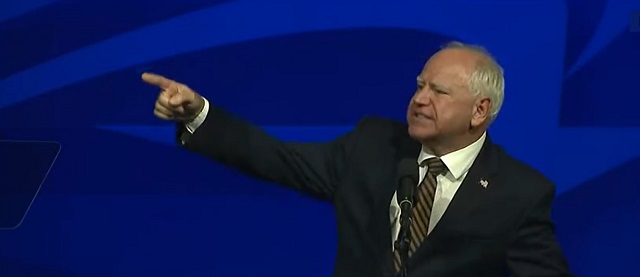Daily Caller
Tim Walz And The Hidden Story Of Twin Metals

 From the Daily Caller News Foundation
From the Daily Caller News Foundation
The media is now working overtime to rewrite the background of the Harris-Walz ticket. With all eyes shifting to Vice President Kamala Harris’ running mate, Minnesota Gov. Tim Walz, they have their work cut out.
Get ready for a new, refined version of Walz, where he is cast as a moderate, pro-worker Midwesterner — meant to balance out Kamala’s left-wing liberalism. But Walz is not that and American steelworkers, their families and the communities surrounding the Twin Metals Mine of Northeast Minnesota know this all too well.
Northeastern Minnesota is blessed with a plethora of critical and strategic metals that are key components to our modern life. There is an area referred to as the Duluth Complex that, according to the U.S. Geological Survey, is home to the largest undeveloped deposits of nickel, cobalt and platinum group minerals (PGM) in the world.
The Twin Metals mine in particular is positioned to be a state-of-the-art underground operation within the Duluth Complex using advanced and precise methods of extraction that could deliver these much-needed metals to growing markets.
Given that these metals are key components to cell phones and cars — both gas-powered and electric — as well as solar panels and windmills, the location of these minerals here in the United States should be good news. This should especially be true for an administration like Biden-Harris that is hell-bent on restructuring our entire utility and vehicle industries, so they are more “green.”
From a practical perspective, this type of restructuring will require an immense amount of the minerals that are located at, and very accessible in, the Twin Metals mine. Globally, one estimate suggests that to reach electrification goals the world will need to produce the same amount of copper in the next 25 years as humanity has produced in the last 5,000.
Unfortunately, the Biden-Harris administration not only cancelled two long-standing mineral leases at the Twin Metals mine, but they also imposed a 20-year moratorium on the surrounding area. This decision imperiled the 750 direct jobs and 1,500 spinoff jobs in the surrounding community that the mine would have supported.
Many of these jobs were for United Steelworkers who were set to buildout and operate the $1.7 billion mine. As often as the Biden-Harris administration talked about creating green energy jobs, they took numerous actions that cancelled the ones that actually did exist.
Walz oversaw the entire debacle. And when the Twin Metals mine and local jobs organizations asked for a lifeline in the aftermath of the Biden-Harris cancellation, he answered it with … more process! Specifically, Walz’s Department of Natural Resources (DNR) allowed the mine to explore surrounding state and private lands for minerals but reiterated there would be no actual mining, and such a decision would likely be years into the future after “lengthy environmental review and permitting.”
In other, non-bureaucratic words: It’s paralysis by analysis for the project.
These cancelled mining projects and jobs would have been done consistent with U.S. safety and environmental standards. Instead, China will reap the benefits of the Biden-Harris cancellation and Walz’s complacency.
Beyond concern for negative environmental impacts, some reports have found that foreign sourced minerals are mined using child forced labor. From a national security purview, this anti-development approach is equally damaging as U.S. reliance on foreign-sourced minerals continues to grow. Specifically, for the minerals buried in abundance at the Twin Metals mine, the U.S. is over 50% import reliant for nickel, 79% reliant for platinum, 76% reliant for cobalt, and 37% reliant for copper.
Those who have seen Walz work up close, including Republican Rep. Pete Stauber, have sounded the alarm on the consequences of his anti-mining, anti-energy policies. Under his watch Minnesota electricity costs have skyrocketed for residents.
For businesses, it’s even worse. Minnesota now boasts the highest industrial electricity prices in the Midwest.
Walz’s folksy appearance aside, he has embraced California-style climate zealotry to the extreme. He signed his state up for “100 percent carbon free electricity by 2040” which is estimated to cost billions of dollars, double electricity prices by 2034, lead to blackouts and kill jobs.
He also wants to ban gas-powered vehicles in the process.
Walz’s aggressive, anti-development approach, especially on energy and the environment, mirrors that of failing socialist nations. It is no wonder Minnesota has experienced significant downfalls under his leadership.
Regardless of how the media portrays him, they cannot erase his record of selling out the workers of Twin Metals mine to the liberal Left.
Mandy Gunasekara served as chief of staff to the U.S. Environmental Protection Agency under President Trump.
The views and opinions expressed in this commentary are those of the author and do not reflect the official position of the Daily Caller News Foundation.
(Featured Image Media Credit: Screen Capture/CSPAN)
Censorship Industrial Complex
School Cannot Force Students To Use Preferred Pronouns, US Federal Court Rules


From the Daily Caller News Foundation
“Our system forbids public schools from becoming ‘enclaves of totalitarianism.’”
A federal appeals court in Ohio ruled Thursday that students cannot be forced to use preferred pronouns in school.
Defending Education (DE) filed the suit against Olentangy Local School District (OLSD) in 2023, arguing the district’s anti-harassment policy that requires students to use the “preferred pronouns” of others violates students’ First Amendment rights by “compelling students to affirm beliefs about sex and gender that are contrary to their own deeply held beliefs.” Although a lower court attempted to shoot down the challenge, the appeals court ruled in a 10-7 decision that the school cannot “wield their authority to compel speech or demand silence from citizens who disagree with the regulators’ politically controversial preferred new form of grammar.”
Because the school considers transgender students to be a protected class, students who violated the anti-harassment policy by referring to such students by their biological sex risked punishments such as suspension and expulsion, according to DE.
Dear Readers:
As a nonprofit, we are dependent on the generosity of our readers.
Please consider making a small donation of any amount here.
Thank you!
“American history and tradition uphold the majority’s decision to strike down the school’s pronoun policy,” the court wrote in its opinion. “Over hundreds of years, grammar has developed in America without governmental interference. Consistent with our historical tradition and our cherished First Amendment, the pronoun debate must be won through individual persuasion, not government coercion. Our system forbids public schools from becoming ‘enclaves of totalitarianism.’”
OLSD did not respond to the Daily Caller News Foundation’s request for comment.
“We are deeply gratified by the Sixth Circuit’s intensive analysis not only of our case but the state of student First Amendment rights in the modern era,” Nicole Neily, founder and president of DE, said in a statement. “The court’s decision – and its many concurrences – articulate the importance of free speech, the limits and perils of public schools claiming to act in loco parentis, and the critical role of persuasion – rather than coercion – in America’s public square.”
“Despite its ham-fisted attempt to moot the case, Olentangy School District was sternly reminded by the 6th circuit en banc court that it cannot force students to express a viewpoint on gender identity with which they disagree, nor extend its reach beyond the schoolhouse threshold into matters better suited to an exercise of parental authority,” Sarah Parshall Perry, vice president and legal fellow at DE, said in a statement. “A resounding victory for student speech and parental rights was long overdue for families in the school district and we are thrilled the court’s ruling will benefit others seeking to vindicate their rights in the classroom and beyond.”
Business
Bill Gates Gets Mugged By Reality


From the Daily Caller News Foundation
You’ve probably heard by now the blockbuster news that Microsoft founder Bill Gates, one of the richest people to ever walk the planet, has had a change of heart on climate change.
For several decades Gates poured billions of dollars into the climate industrial complex.
Some conservatives have sniffed that Bill Gates has shifted his position on climate change because he and Microsoft have invested heavily in energy intensive data centers.
AI and robotics will triple our electric power needs over the next 15 years. And you can’t get that from windmills.
What Bill Gates has done is courageous and praiseworthy. It’s not many people of his stature that will admit that they were wrong. Al Gore certainly hasn’t. My wife says I never do.
Although I’ve only once met Bill Gates, I’ve read his latest statements on global warming. He still endorses the need for communal action (which won’t work), but he has sensibly disassociated himself from the increasingly radical and economically destructive dictates from the green movement. For that, the left has tossed him out of their tent as a “traitor.”
I wish to highlight several critical insights that should be the starting point for constructive debate that every clear-minded thinker on either side of the issue should embrace.
(1) It’s time to put human welfare at the center of our climate policies. This includes improving agriculture and health in poor countries.
(2) Countries should be encouraged to grow their economies even if that means a reliance on fossil fuels like natural gas. Economic growth is essential to human progress.
(3) Although climate change will hurt poor people, for the vast majority of them it will not be the only or even the biggest threat to their lives and welfare. The biggest problems are poverty and disease.
I would add to these wise declarations two inconvenient truths: First: the solution to changing temperatures and weather patterns is technological progress. A far fewer percentage of people die of severe weather events today than 50 or 100 or 1,000 years ago.
Second, energy is the master resource and to deny people reliable and affordable energy is to keep them poor and vulnerable – and this is inhumane.
If Bill Gates were to start directing even a small fraction of his foundation funds to ensuring everyone on the planet has access to electric power and safe drinking water, it would do more for humanity than all of the hundreds of billions that governments and foundations have devoted to climate programs that have failed to change the globe’s temperature.
Stephen Moore is a co-founder of Unleash Prosperity and a former Trump senior economic advisor.
-

 Business1 day ago
Business1 day agoCarney budget continues misguided ‘Build Canada Homes’ approach
-

 espionage2 days ago
espionage2 days agoU.S. Charges Three More Chinese Scholars in Wuhan Bio-Smuggling Case, Citing Pattern of Foreign Exploitation in American Research Labs
-

 Business1 day ago
Business1 day agoCarney budget doubles down on Trudeau-era policies
-

 Business18 hours ago
Business18 hours agoBill Gates Gets Mugged By Reality
-

 COVID-191 day ago
COVID-191 day agoCrown still working to put Lich and Barber in jail
-

 Alberta14 hours ago
Alberta14 hours agoTell the Province what you think about 120 km/h speed limit on divided highways
-

 Business1 day ago
Business1 day agoHere’s what pundits and analysts get wrong about the Carney government’s first budget
-

 armed forces13 hours ago
armed forces13 hours agoThe Liberal Government Just Betrayed Veterans. Again. Right Before Remembrance Day.









